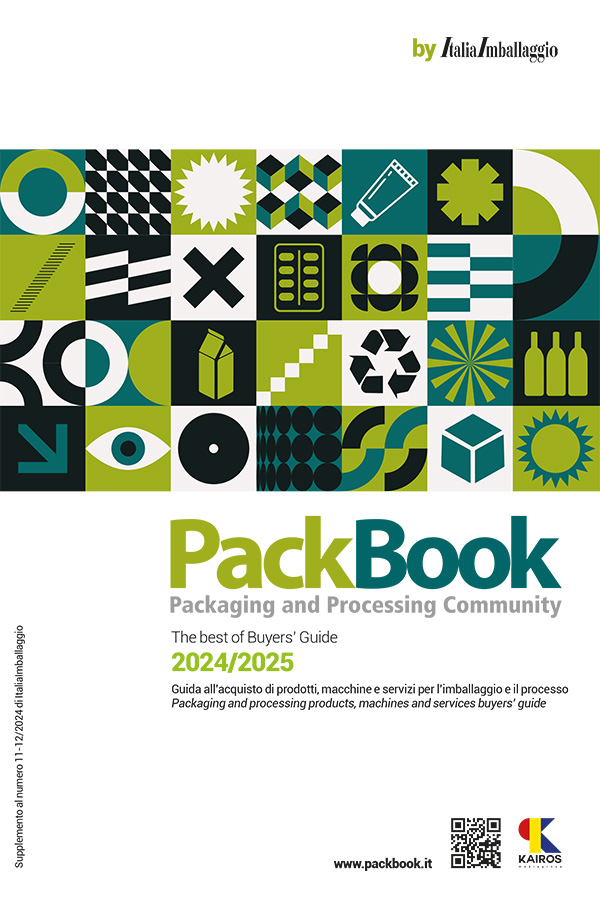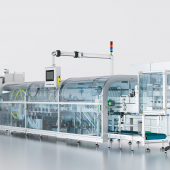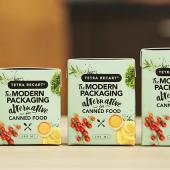The new packaging Regulation
Points of interest from the conference, which consolidates the Italian front of the industrial supply chains involved. Critical voices both on the merits of the regulation that impacts on enterprises, and on the European decision-making process, in which clear and transparent scientific evaluations are missing.
By the Editors
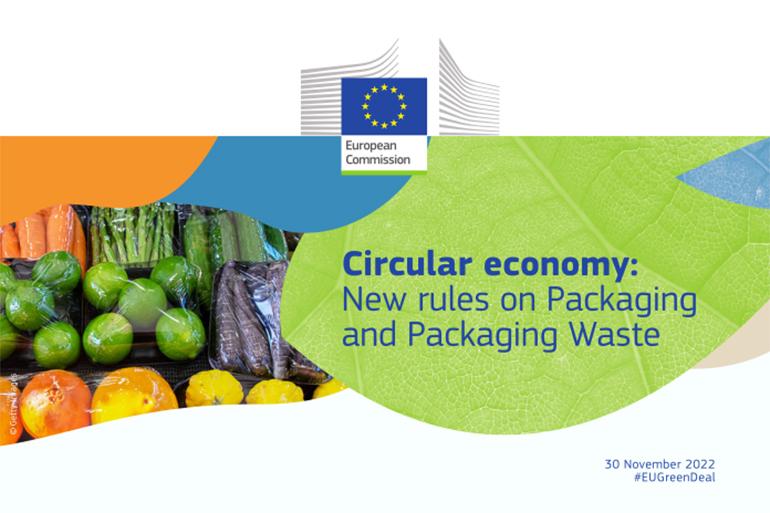
Held in the Galdi offices on 9 February, the “Packaging regulations and the impact on the packaging supply chain” conference was an opportunity for a wide-ranging discussion between different institutional operators, end-users and stakeholders involved in various capacities with respect to the new European packaging regulation.
Promoted by Ucima, Amaplast and Confindustria as an opportunity for exchange between companies in the Veneto area, the day actually represented an important occasion for presenting an overview of the situation, combining institutional views, technical analysis of the regulation and the opinions of enterprises, including the particular points of view of specific production segments such as the pharmaceutical and dairy sectors.
Opening the proceedings, Amaplast, Ucima and Confindustria Veneto Est highlighted critical areas, possible evolutions and new market scenarios, with the common goal of discussing the actions underway at national and European level.
These were concepts referred to by the Confindustria Manager for Industrial Policies and Sustainability, Marco Ravazzolo, who expressed a very clear opinion on the line taken by Italian industrialists:
«We will not accept the paradigm shift of the new European regulation from recycling to reuse» he affirmed, also because it is widespread opinion that the Regulation is based on an approach not supported by scientific and measurable data. In this regard, it is sufficient to refer to the failed evaluation of the massive use of water required for reuse. The relationship between demagoguery and the objective measurement of impacts was, in fact, the common theme of the day, with a series of contributions that highlighted the limits of a decision that does not establish standards based on scientific data, but follows movements of public opinion often influenced by simplistic interpretations, the effects of which can be devastating on the Italy’s economic and industrial fabric.
Italy has, in fact, recycling percentages close to 75% and an industrial sector capable of covering the entire supply chain, from the development of innovative materials to sustainable packaging, from the management of recycling processes to end-of-life. This was an aspect particularly underlined in the contribution of Alberto Palaveri, Chairman of Giflex, who expressed his concerns affirming: «We believe that this regulation does not accelerate development but hinders it, with the risk of making our companies poorer and consumers less protected in terms of safety».
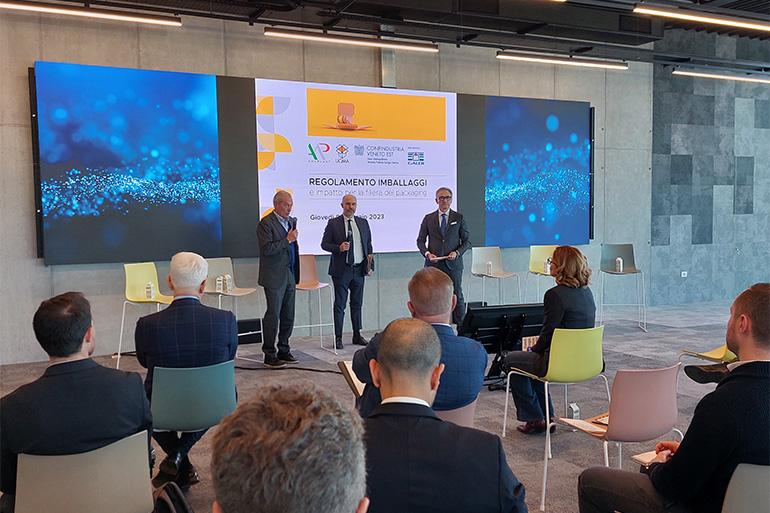
No to arbitrary and penalising choices
The meeting was also the setting for a detailed analysis of the directive by interest groups such as EUROPEN (The European Organization for Packaging and the Environment) and category associations such as Giflex, leaving space, however, for the crucial point of view of end-users; Labomar and Latterie Montello (Nonno Nanni), operators in the consumer goods sector, offered an overview of the problems connected with the reuse concept applied to critical sectors such as pharmaceuticals and dairy products.
- The contribution of Francesca Stevens, General Secretary of EUROPEN was highly analytical, covering a number of the more critical but not necessarily negative areas of the Directive, drawing out, however, fundamental issues, first and foremost, the need to form a common front, coordinate actions and create alliances between member States with supply chains operating in the recycling, packaging and materials market. Much concern was expressed about the general character of the Directive, which lacks essential details for its application:
«Member States have expressed their objection to various aspects - affirmed Stevens – and the Commission is opening up to different measures at national level both on labelling and on reuse targets, offering greater freedom also with respect to the list of materials subject to targets».
The proposal applies, in fact, to all packaging, regardless of the material and the type of recycling involved, with the aim of an overall reduction in the volume of waste on the basis of targets fixed at 10% by 2035 and 15% by 2040. Restrictions are also envisaged on various packaging formats, on overpackaging no longer justified by marketing and on overall volumes, in particular, considering the development of e-commerce.
«The recycling percentages - continued Stevens – are also cause for concern since the volumes that guarantee remaining on the market after the deadlines of 2030 and 2035 are not clear. It is the general character of the Directive that worries, as it makes reference to implementation decrees after its formal adoption. The absence of specific technical know-how within the Commission regarding packaging issues obliges the involvement of all the supply chains in the affected industrial sectors and it would be better if this occurred upstream of the regulation, precisely to improve the proposal and escape from a vagueness that risks becoming a slippery slope for everyone».

Over to the producers
- A fundamental part of the day was the meeting between those operating in the market, in particular, in two sectors such as food and pharmaceuticals, and it was about the latter that Walter Bertin, Chairman and CEO of Labomar Spa, referred, describing the importance of the use of recycled material for medicines.
«We have products that overlap with food products» Bertin stated, «but a tablet contains active ingredients that must be preserved until the effective administration of the therapy. Everything revolves around a quality and safety system, in which stability tests last 24-36 months, not a few weeks, while it is precisely in this period that a medicine begins to show problems of stability if packaged with recycled material. We are working on a mono-material blister, but the patient’s safety must always come first. Another theme is machinability, in which, for example, recycled paper affects the speed of packaging but also raises questions of procurement, given that it is in high demand. There are also, however, positive aspects: we can refer to the standardisation imposed by the Directive, which would allow for entry into all the European markets with the same labelling and materials rules, effectively opening up an important simplification that benefits a medicine’s safety».
- Alessandro Lazzarin, Chairman of Latteria Montello (Nonno Nanni), was more optimistic, especially with regards to the sector’s capacity for innovation; he highlighted the importance of this type of event, underlining how the ability to innovative is a key element.
«Constantly updating technology and commitment to R&D» he declared «allows us to react to changes like the ones on the horizon. Producers of materials, machines, and sectors like our own, in which shelf-life is essential, are constantly working together, researching new solutions that today are focused primarily on sustainability. We have been far-sighted, aiming at flexibility and never forgetting to create networks and construct projects based on collaboration between all the parties involved in our supply chains. That is why we feel we are ready for the change and believe that two or three years, working on innovation, will be enough to find new solutions that allow us to govern the huge transformations in progress, which we consider to be inevitable».
Ucima and Amaplast contributions
The contributions opening the proceedings of the “Regolamento imballaggi e impatto per la filiera del packaging” (Packaging regulations and the impact on the packaging supply chain) conference by the chairmen of Ucima and Amaplast focused on the culture of innovation, oriented in particular towards sustainability in the Italian packaging sector, but also on the need to protect a heritage of know-how and competitiveness without equal in the world and which risks being damaged by a provision which, if implemented in daily practice, has few realistic features.
«We are not against change» declared Riccardo Cavanna, Chairman of Ucima. «The problem is that this regulation is creating confusion. We have always played a key role in enabling the supply chain to achieve important results in terms of the circular economy, but we need a concrete approach which builds on the path taken so far. We mustn’t forget that safeguarding our planet is the shared objective».
Dario Previero, Chairman of Amaplast, echoed Ucima’s call, continuing on the same line, emphasising the practical side of this supposed revolution, which so far has only had the worthy merit of having consolidated a common industrial front of reference. In this regard, in fact, he affirmed that
«The technical feasibility of the new regulation is not an aspect to be undervalued and should be assessed very carefully. A common front between Associations has the aim of voicing companies’ concerns and seeking the best possible solution».
